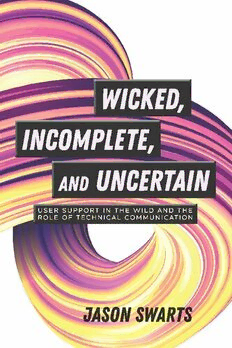
Wicked, Incomplete, and Uncertain: User Support in the Wild and the Role of Technical Communication PDF
Preview Wicked, Incomplete, and Uncertain: User Support in the Wild and the Role of Technical Communication
WICKED, INCOMPLETE, AND UNCERTAIN WICKED, INCOMPLETE, AND UNCERTAIN User Support in the Wild and the Role of Technical Communication JASON SWARTS UTAH STATE UNIVERSITY PRESS Logan © 2018 by University Press of Colorado Published by Utah State University Press An imprint of University Press of Colorado 245 Century Circle, Suite 202 Louisville, Colorado 80027 All rights reserved Printed in the United States of America The University Press of Colorado is a proud member of the Association of University Presses. The University Press of Colorado is a cooperative publishing enterprise supported, in part, by Adams State University, Colorado State University, Fort Lewis College, Metropolitan State University of Denver, Regis University, University of Colorado, University of Northern Colorado, Utah State University, and Western State Colorado University. ∞ This paper meets the requirements of the ANSI/NISO Z39.48-1992 (Permanence of Paper) ISBN: 978-1-60732-761-5 (pbk.) ISBN: 978-1-60732-762-2 (ebook) DOI: https://doi.org/10.7330/9781607327622 Library of Congress Cataloging-in-Publication Data Names: Swarts, Jason, 1972– author. Title: Wicked, incomplete, and uncertain : user support in the wild and the role of tech- nical communication / Jason Swarts. Description: Logan : Utah State University Press, [2018] | Includes bibliographical refer- ences and index. Identifiers: LCCN 2017045680| ISBN 9781607327615 (pbk.) | ISBN 9781607327622 (ebook) Subjects: LCSH: Technical writing. | Technology—Documentation. | Communication of technical information. Classification: LCC T11 .S775 2018 | DDC 808.06/66—dc23 LC record available at https://lccn.loc.gov/2017045680 Cover illustration © Artem Kovalenco/Shutterstock. CONTENTS 1 The Exigencies and Forms of Technical Communication 3 2 Task Shift: Changes in the Object of Documentation 23 3 Shifted Tasks and Shifted Problems: The Problem of Wicked and Tame Problems 38 4 Credibility and User Interaction: The Challenge of Decentered Expertise 64 5 A Survey of Action-Based Proto-Genres of Help 96 6 The Role of Technical Communication 132 References 153 About the Author 159 Index 161 WICKED, INCOMPLETE, AND UNCERTAIN 1 THE EXIGENCIES AND FORMS OF TECHNICAL COMMUNICATION A fundamental challenge of organized human labor is to coordinate with others on both the concept and object of work. To assist with that coordination, we have constructed a bewilderingly large and complex array of supporting technologies and texts that orient us to our work. Out of this context, the profession of technical communication has emerged, to help accommodate technologies and texts to our situated uses. Documentation including technical manuals, procedures, and instructions has emerged mushroom-like around new technologies, as they have since the origins of the field. What has changed about tech- nological development since the first technical manual, however, is the speed of technological development and iteration, the capacity for user customization, and the extent to which technologies have become inte- gral to daily work. The changes are reflected in the form and content of documentation, and comparing technical manuals from the early pre-history of the field of technical communication to today reveals dif- ferences in approaches that tell of these changes in our access to and use of technology. Also reflected are changes in the rhetorical situations that we address with technology. Not only have our tasks changed, but also the ways technologies portray those tasks to us. It would seem that technical manuals have an increasingly important role to play, mediating access to our technologies and, through them, to our work and each other. Still, few people read manuals today and the genre itself seems increasingly out of time. The reasons are compli- cated. Users have not become more universally adept at learning and using new technologies, as the idea of the “digital native” would have us believe. We still need help, but increasingly we are ignoring manuals because our purposes have grown beyond what manuals are capable of addressing. This book offers a consideration of what users need from technical communicators, which turns out to be much more than thor- ough knowledge of a technology, presented with scrupulous attention to the formal conventions of task-oriented manuals. Generating raw DOI: 10.7330/9781607327622.c001
